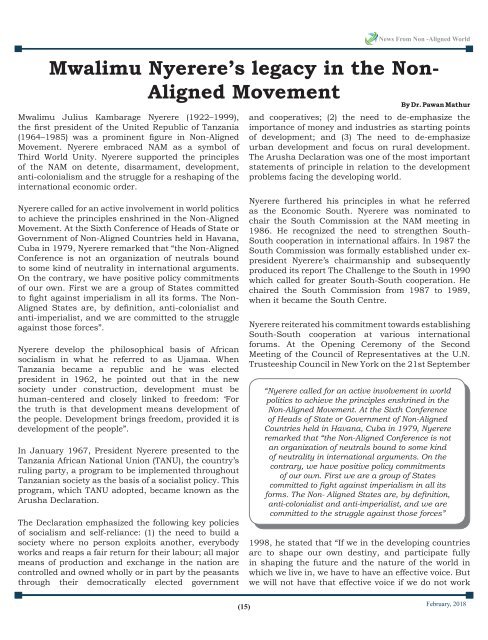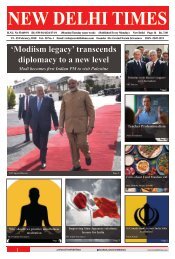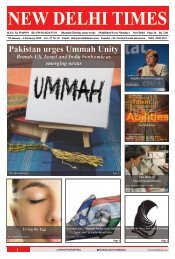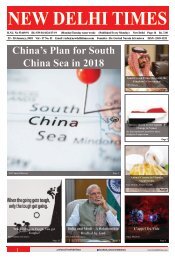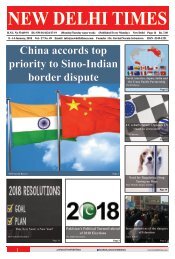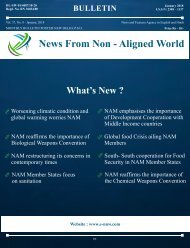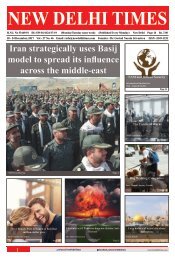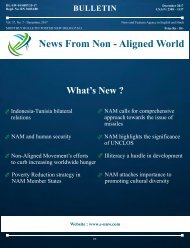10 february 2018_final
You also want an ePaper? Increase the reach of your titles
YUMPU automatically turns print PDFs into web optimized ePapers that Google loves.
Mwalimu Nyerere’s legacy in the Non-<br />
Aligned Movement<br />
By Dr. Pawan Mathur<br />
Mwalimu Julius Kambarage Nyerere (1922–1999),<br />
the first president of the United Republic of Tanzania<br />
(1964–1985) was a prominent figure in Non-Aligned<br />
Movement. Nyerere embraced NAM as a symbol of<br />
Third World Unity. Nyerere supported the principles<br />
of the NAM on detente, disarmament, development,<br />
anti-colonialism and the struggle for a reshaping of the<br />
international economic order.<br />
Nyerere called for an active involvement in world politics<br />
to achieve the principles enshrined in the Non-Aligned<br />
Movement. At the Sixth Conference of Heads of State or<br />
Government of Non-Aligned Countries held in Havana,<br />
Cuba in 1979, Nyerere remarked that “the Non-Aligned<br />
Conference is not an organization of neutrals bound<br />
to some kind of neutrality in international arguments.<br />
On the contrary, we have positive policy commitments<br />
of our own. First we are a group of States committed<br />
to fight against imperialism in all its forms. The Non-<br />
Aligned States are, by definition, anti-colonialist and<br />
anti-imperialist, and we are committed to the struggle<br />
against those forces”.<br />
Nyerere develop the philosophical basis of African<br />
socialism in what he referred to as Ujamaa. When<br />
Tanzania became a republic and he was elected<br />
president in 1962, he pointed out that in the new<br />
society under construction, development must be<br />
human-centered and closely linked to freedom: ‘For<br />
the truth is that development means development of<br />
the people. Development brings freedom, provided it is<br />
development of the people”.<br />
In January 1967, President Nyerere presented to the<br />
Tanzania African National Union (TANU), the country’s<br />
ruling party, a program to be implemented throughout<br />
Tanzanian society as the basis of a socialist policy. This<br />
program, which TANU adopted, became known as the<br />
Arusha Declaration.<br />
The Declaration emphasized the following key policies<br />
of socialism and self-reliance: (1) the need to build a<br />
society where no person exploits another, everybody<br />
works and reaps a fair return for their labour; all major<br />
means of production and exchange in the nation are<br />
controlled and owned wholly or in part by the peasants<br />
through their democratically elected government<br />
News From Non -Aligned World<br />
and cooperatives; (2) the need to de-emphasize the<br />
importance of money and industries as starting points<br />
of development; and (3) The need to de-emphasize<br />
urban development and focus on rural development.<br />
The Arusha Declaration was one of the most important<br />
statements of principle in relation to the development<br />
problems facing the developing world.<br />
Nyerere furthered his principles in what he referred<br />
as the Economic South. Nyerere was nominated to<br />
chair the South Commission at the NAM meeting in<br />
1986. He recognized the need to strengthen South-<br />
South cooperation in international affairs. In 1987 the<br />
South Commission was formally established under expresident<br />
Nyerere’s chairmanship and subsequently<br />
produced its report The Challenge to the South in 1990<br />
which called for greater South-South cooperation. He<br />
chaired the South Commission from 1987 to 1989,<br />
when it became the South Centre.<br />
Nyerere reiterated his commitment towards establishing<br />
South-South cooperation at various international<br />
forums. At the Opening Ceremony of the Second<br />
Meeting of the Council of Representatives at the U.N.<br />
Trusteeship Council in New York on the 21st September<br />
“Nyerere called for an active involvement in world<br />
politics to achieve the principles enshrined in the<br />
Non-Aligned Movement. At the Sixth Conference<br />
of Heads of State or Government of Non-Aligned<br />
Countries held in Havana, Cuba in 1979, Nyerere<br />
remarked that “the Non-Aligned Conference is not<br />
an organization of neutrals bound to some kind<br />
of neutrality in international arguments. On the<br />
contrary, we have positive policy commitments<br />
of our own. First we are a group of States<br />
committed to fight against imperialism in all its<br />
forms. The Non- Aligned States are, by definition,<br />
anti-colonialist and anti-imperialist, and we are<br />
committed to the struggle against those forces”<br />
1998, he stated that “If we in the developing countries<br />
arc to shape our own destiny, and participate fully<br />
in shaping the future and the nature of the world in<br />
which we live in, we have to have an effective voice. But<br />
we will not have that effective voice if we do not work<br />
(15)<br />
February, <strong>2018</strong>


